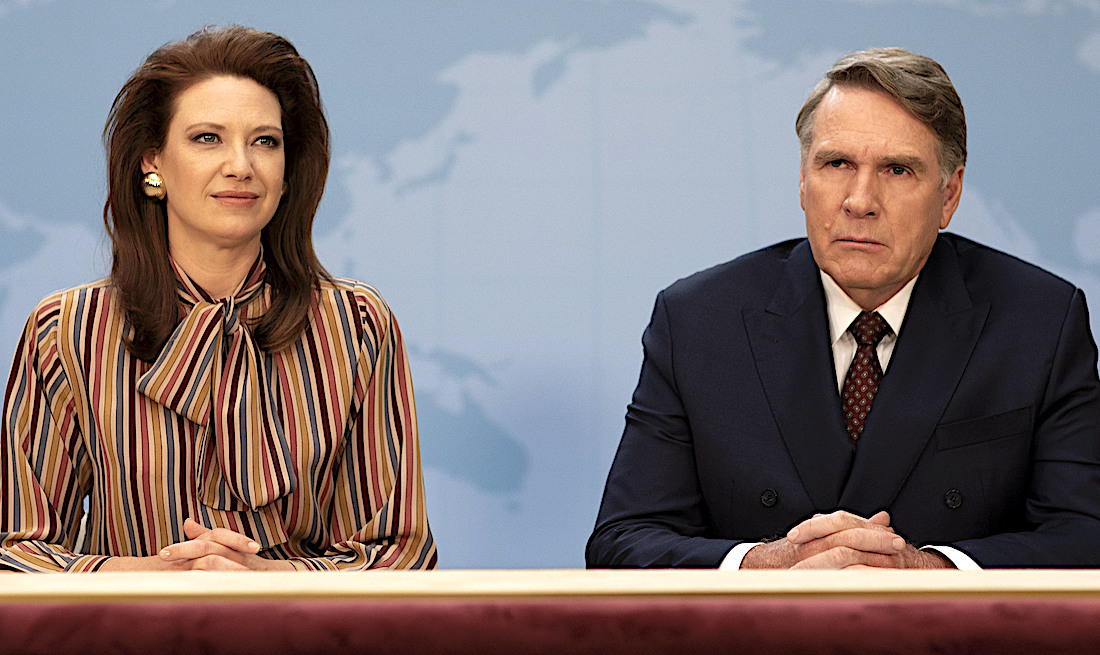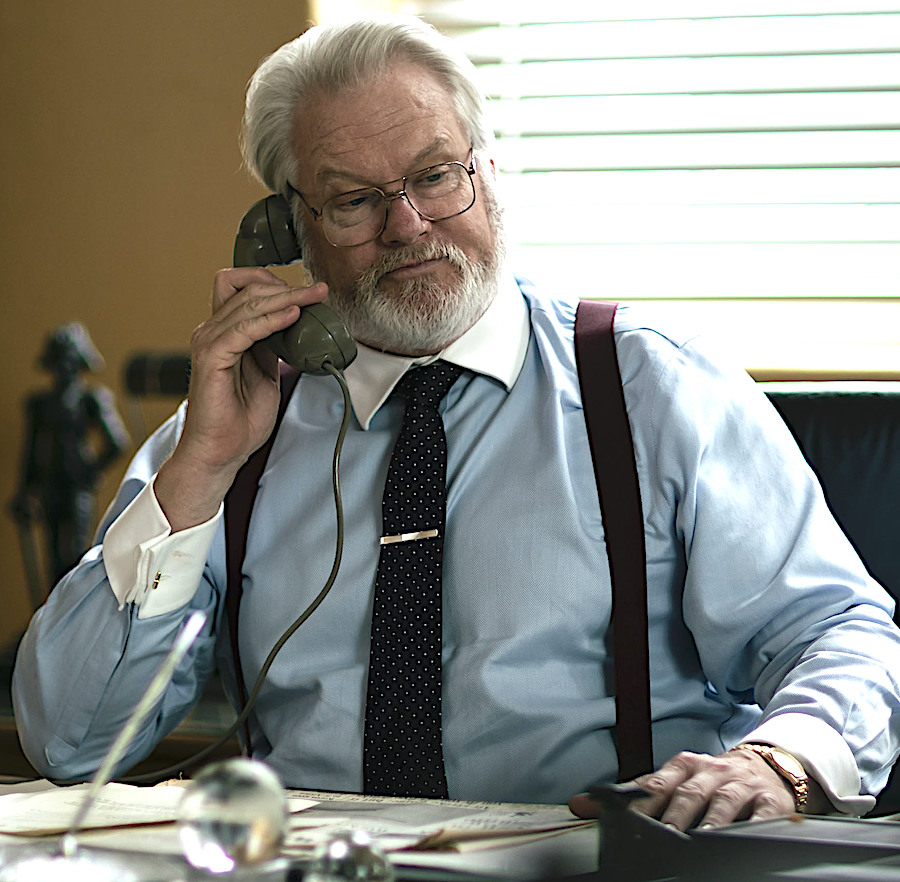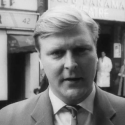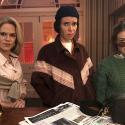Period drama from Australia is something of a rarity on our televisions, so The Newsreader scores for novelty alone. It’s not startlingly innovative in form, but it does what it sets out to do in a highly satisfying way. Which is to tell a tale of everyday misogyny, racism, homophobia and backstabbing in the Aussie television industry of the mid-1980s.
Running throughout are regular datelines, starting with the weekend of the Challenger disaster in February 1986 and progressing through to Chernobyl the following April. This timeline isn’t just adding handy topical references: these are the plum news events that stir the journalists’ blood, rouse them from their hangovers and rev up their sex drives.
The titular newsreader (we assume from the early episodes) is Helen Norville, played by Anna Torv, previously seen in Fringe. Helen is a glamorous presenter in the young Barbara Walters vein, with an older, gnarly co-anchor, Geoff Walters (Robert Taylor, pictured below). Geoff, he likes to remind people, has come to Melbourne’s News at Six presenter desk via the jungles of Vietnam, but his reporting experience is losing its currency. He clearly sees himself as the senior member of the team, battling for position off-camera with the volatile Helen, who is all cool stateliness on-screen but a mess off it. Geoff baulks at the “glamour” that Upstairs are demanding in bulletins — which means items about pop stars, soap actors and sports personalities.
 Presiding over this fractious newsroom is a dyspeptic boss, Lindsay Cunningham (William McInnes, pictured below), whose explosions seem to be so routine that few of his staff react to them other than by keeping their heads slightly further below the parapet. Among the staff are a former Aussie Rules star turned sports reporter, an Asian news editor, a half-Thai cameraman who keeps his homosexuality quiet and an able Korean junior who does more than her fair share of the work: a mini melting pot that allows the script to probe the unattractive hidden currents of Australian corporate life. One of the strengths of the series is the unshowy way it goes about stirring this pot. There are no unearned crises or implausible twists. Life itself is left to provide those. The writing carves out niches for the characters inside the potential stereotypes, and the actors rise to it.
Presiding over this fractious newsroom is a dyspeptic boss, Lindsay Cunningham (William McInnes, pictured below), whose explosions seem to be so routine that few of his staff react to them other than by keeping their heads slightly further below the parapet. Among the staff are a former Aussie Rules star turned sports reporter, an Asian news editor, a half-Thai cameraman who keeps his homosexuality quiet and an able Korean junior who does more than her fair share of the work: a mini melting pot that allows the script to probe the unattractive hidden currents of Australian corporate life. One of the strengths of the series is the unshowy way it goes about stirring this pot. There are no unearned crises or implausible twists. Life itself is left to provide those. The writing carves out niches for the characters inside the potential stereotypes, and the actors rise to it.
Enter a young hopeful, Dale Jennings (Sam Reid), who has the wholesome good looks and burning ambition to be a newsreader. He has a messy tryout and is mostly still deployed as a junior producer of special reports; but like Geoff he aims for substance in his pitches to Lindsay and ends up being assigned fluff. He idolises Helen, whose off-screen problems he is soon caught up in. When their relationship deepens, he boosts his status in the office. But it’s a precarious position, too, leaving him open to colleagues’ jibes, and worse. HIs relationship with Helen evolves in tandem with his career: both turn him on.
 The period feel of the piece is masterfully done, a filter giving it a dingy look that accentuates the browns, beiges and dirty greens of the spot-on decor and fashions. It’s all the better for not screaming, “Look how authentic we’ve made it!” In this analogue world, most phones are attached to a wall and often turn out to be engaged on another call, taped recordings have to be despatched to the studio by taxi or bike (or, in one memorable episode, in the hand of the sports reporter as he legs it through the city), live feeds are unreliable, tape machines stick. This isn’t just authentic detail: it creates a test bed for the journalists’ stamina and gumption.
The period feel of the piece is masterfully done, a filter giving it a dingy look that accentuates the browns, beiges and dirty greens of the spot-on decor and fashions. It’s all the better for not screaming, “Look how authentic we’ve made it!” In this analogue world, most phones are attached to a wall and often turn out to be engaged on another call, taped recordings have to be despatched to the studio by taxi or bike (or, in one memorable episode, in the hand of the sports reporter as he legs it through the city), live feeds are unreliable, tape machines stick. This isn’t just authentic detail: it creates a test bed for the journalists’ stamina and gumption.
What the script also gratifyingly gets right is its key issue: the emergence of the data-driven approach to what would now be called content – at this stage, the data are the station’s all-important ratings, which Upstairs tracks with a grim religiosity. Serious news, we realise, is doomed if the ratings say people don’t watch it readily and want only entertainment. And chequebook journalism is on the rise.
Dale is the bellwether here: will he stick to his commitment to serious issues, inevitably buffeted by the more cynical forces of his workplace, or will he join the glamour-is-good brigade? Reid gives an impressively delicate performance, an unnamed fear lurking behind his confident smile.
If you get hooked on this six-part series, a second tranche of six episodes has already been commissioned.















Add comment